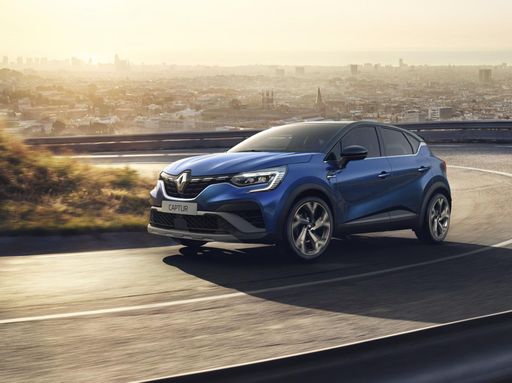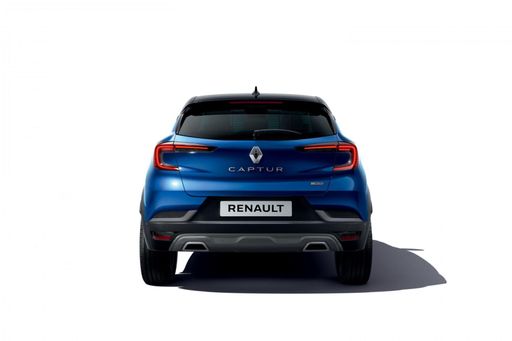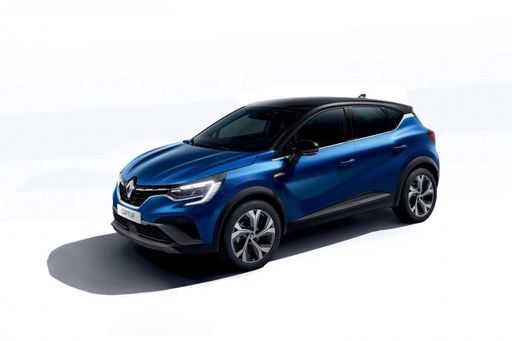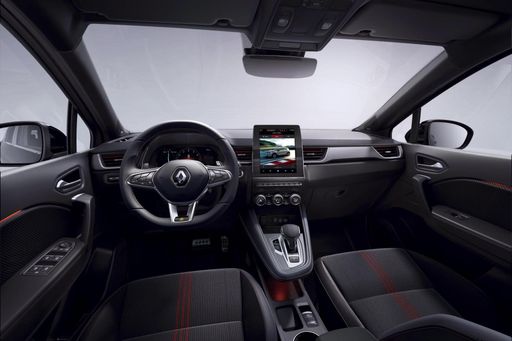Renault Captur VS Peugeot 208 – Specs, Efficiency & Price Comparison
Find out now which car fits your needs better!
The Renault Captur (SUV) is powered by a Petrol MHEV, LPG, Petrol or Full Hybrid engine and comes with a Manuel or Automatic transmission. In comparison, the Peugeot 208 (Hatchback) features a Petrol, Electric or Petrol MHEV engine and a Manuel or Automatic gearbox.
When it comes to boot capacity, the Renault Captur offers 422 L, while the Peugeot 208 provides 352 L – depending on what matters most to you. If you’re looking for more power, you’ll need to decide whether the 158 HP of the Renault Captur or the 156 HP of the Peugeot 208 suits your needs better.
There are also differences in efficiency: 4.50 L vs 14.10 kWh4.50 L. In terms of price, the Renault Captur starts at 20400 £, while the Peugeot 208 is available from 20200 £.
Compare all the key specs now and find out which model fits your lifestyle best!
In the battle of the compacts, the Peugeot 208 and Renault Captur both bring distinctive flair to the table, though they cater to slightly different needs. The Peugeot 208 impresses with its sporty design and nimble handling, making it ideal for those who crave a spirited drive in the city. Meanwhile, the Renault Captur offers a bit more space and versatility, making it a practical choice for small families seeking an urban crossover experience.
Renault Captur
The Renault Captur is a compact SUV that combines stylish design with practical functionality, making it a popular choice for urban drivers. Its interior offers a versatile and comfortable space, featuring high-quality materials and modern technology. On the road, the Captur delivers a smooth and efficient driving experience, perfect for both city commutes and weekend adventures.
details @ renault-presse.de
@ renault-presse.de
 @ renault-presse.de
@ renault-presse.de
 @ renault-presse.de
@ renault-presse.de
 @ renault-presse.de
@ renault-presse.de
Peugeot 208
The Peugeot 208 exudes a distinctive French charm, combining sleek lines with an assertive stance on the road. Inside, it offers a modern and sophisticated cabin, complete with intuitive technology and high-quality finishes to enhance the driving experience. Its agile handling and efficient performance make it a delightful choice for both city commuting and longer journeys.
details @ www.media.stellantis.com
@ www.media.stellantis.com
 @ www.media.stellantis.com
@ www.media.stellantis.com
 @ www.media.stellantis.com
@ www.media.stellantis.com
 @ www.media.stellantis.com
@ www.media.stellantis.com
The Stylish Debate: Peugeot 208 vs. Renault Captur
In the competitive world of compact cars, the Peugeot 208 and Renault Captur stand out for their excellence and innovation. While both vehicles offer cutting-edge technology and efficiency, they cater to different sensibilities and lifestyles. Below, we dive deep into technical comparisons and unique features, helping you decide which sleek ride suits you best.
Design and Dimensions
When it comes to visual appeal, the French excel. The Peugeot 208 is a classic hatchback infused with modernity, boasting a bold front grille and signature LED lighting. Its compact design, measuring 4,055 mm in length, appeals to urban dwellers seeking easy maneuverability.
On the other side, the Renault Captur signifies the spunky aura of an SUV, emboldened with a robust yet elegant stance. Its length of 4,239 mm provides a slightly more imposing presence without losing its agility, perfect for those requiring more cargo space and a higher driving position.
Engine and Performance
The Peugeot 208 offers a variety of engine options, including petrol, petrol mild-hybrid (MHEV), and a fully electric variant. Its power ranges from 101 to 156 HP for the petrol engines, ensuring a blend of efficiency and power. Notably, the electric model features an impressive range of up to 410 km and swift acceleration, reaching 0-100 km/h in just 8.3 seconds.
The Renault Captur, conversely, presents engine choices from LPG to full hybrid configurations. The most robust petrol engine offers 158 HP, and the full hybrid system promises both efficiency and environmental friendliness. Captures acceleration from 0-100 km/h is a respectable 8.5 seconds, paired with a maximum speed of 180 km/h.
Efficiency and Environmental Impact
For eco-conscious drivers, the Peugeot 208 electric version shines with zero CO2 emissions. Traditional petrol models show emissions between 105 to 121 g/km, driven by a three-cylinder engine with superior energy efficiency.
The Renault Captur maintains respectable emission performances across its variants, with the full hybrid emitting as low as 106 g/km of CO2. It emphasizes sustainability with a 4.7 L/100km consumption rate for the hybrid engine - a boon for those prioritizing reduced fuel consumption.
Interiors and Practicality
Inside the Peugeot 208, the i-Cockpit offers a futuristic experience with a digital instrument cluster and touchscreen controls, enhancing driving ease and comfort. Although its trunk capacity is at 309 liters, it is sufficient for urban needs.
The Renault Captur charms with a spacious cabin and a more flexible trunk capacity up to 422 liters. It prioritizes comfort with ergonomic seats and intuitive infotainment features, setting a new standard for interior adaptability within the SUV category.
Conclusion: Which is Right for You?
If you crave electrified efficiency mixed with a dash of the avant-garde aesthetic, the Peugeot 208 presents an appealing proposition. Its compact design and electric option make it an eco-friendly choice ideal for city environments.
Meanwhile, the Renault Captur attracts those who desire more room and versatility, without compromising on sustainability and performance. As an urban SUV, it's perfect for families and adventurous spirits looking for economy, comfort, and style all wrapped into one.
Ultimately, both models radiate distinguished French innovation. Your preference will hinge on lifestyle demands and personal values toward efficiency and style in this classic automotive duel.

|

|
|
|
|
Costs and Consumption |
|
|---|---|
|
Price
20400 - 28300 £
|
Price
20200 - 35100 £
|
|
Consumption L/100km
4.5 - 7.8 L
|
Consumption L/100km
4.5 - 5.2 L
|
|
Consumption kWh/100km
-
|
Consumption kWh/100km
14.1 - 15.4 kWh
|
|
Electric Range
-
|
Electric Range
362 - 432 km
|
|
Battery Capacity
-
|
Battery Capacity
46 - 51 kWh
|
|
co2
102 - 139 g/km
|
co2
0 - 117 g/km
|
|
Fuel tank capacity
40 - 48 L
|
Fuel tank capacity
44 L
|
Dimensions and Body |
|
|---|---|
|
Body Type
SUV
|
Body Type
Hatchback
|
|
Seats
5
|
Seats
5
|
|
Doors
5
|
Doors
5
|
|
Curb weight
1293 - 1514 kg
|
Curb weight
1165 - 1530 kg
|
|
Trunk capacity
326 - 422 L
|
Trunk capacity
309 - 352 L
|
|
Length
4239 mm
|
Length
4055 mm
|
|
Width
1797 mm
|
Width
1745 mm
|
|
Height
1575 mm
|
Height
1430 mm
|
|
Payload
375 - 457 kg
|
Payload
380 - 430 kg
|
Engine and Performance |
|
|---|---|
|
Engine Type
Petrol MHEV, LPG, Petrol, Full Hybrid
|
Engine Type
Petrol, Electric, Petrol MHEV
|
|
Transmission
Manuel, Automatic
|
Transmission
Manuel, Automatic
|
|
Transmission Detail
Schaltgetriebe, Automat. Schaltgetriebe (Doppelkupplung), Automatic Gearbox
|
Transmission Detail
Schaltgetriebe, Automat. Schaltgetriebe (Doppelkupplung)
|
|
Drive Type
Front-Wheel Drive
|
Drive Type
Front-Wheel Drive
|
|
Power HP
91 - 158 HP
|
Power HP
101 - 156 HP
|
|
Acceleration 0-100km/h
8.5 - 14.3 s
|
Acceleration 0-100km/h
8.3 - 10.9 s
|
|
Max Speed
168 - 180 km/h
|
Max Speed
150 - 200 km/h
|
|
Torque
160 - 270 Nm
|
Torque
205 - 270 Nm
|
|
Number of Cylinders
3 - 4
|
Number of Cylinders
3
|
|
Power kW
67 - 116 kW
|
Power kW
74 - 115 kW
|
|
Engine capacity
999 - 1789 cm3
|
Engine capacity
1199 cm3
|
General |
|
|---|---|
|
Model Year
2024 - 2025
|
Model Year
2023 - 2025
|
|
CO2 Efficiency Class
D, C
|
CO2 Efficiency Class
D, A, C
|
|
Brand
Renault
|
Brand
Peugeot
|
Renault Captur
The Renault Captur: A Modern Fusion of Style and Efficiency
The Renault Captur has carved a unique niche for itself in the compact SUV segment, combining eye-catching design with advanced technology. As we delve into its technical specifications and innovative features, it's clear why this model continues to captivate automotive enthusiasts and everyday drivers alike.
Under the Bonnet: Power and Performance
The Renault Captur offers a diverse range of powertrains, catering to different driving preferences and needs. Whether you opt for a full hybrid or a mild-hybrid petrol engine, the Captur provides an impressive blend of power and efficiency. The power output ranges from 91 to 158 PS, ensuring a versatile drive whether you're navigating urban streets or hitting the open road.
With a fuel consumption range of 4.7 to 7.8 L/100km, Renault has engineered the Captur with an environmental focus, presenting one of the more economical offerings in its class. The CO2 emissions range from 106 to 139 g/km, adhering to modern demands for reduced environmental impact without compromising on performance.
Technological Innovation: E-Tech Hybrid System
An exciting feature of the Captur is its E-Tech hybrid system, a testament to Renault's commitment to innovation. This system intelligently combines a petrol engine with an electric motor to optimise energy usage, offering both power and efficiency seamlessly. This technology is particularly beneficial in urban settings where frequent stopping and starting can traditionally increase fuel consumption and emissions.
Driving Dynamics and Comfort
The Renault Captur is built with front-wheel drive and offers both manual and automatic transmission options, including cutting-edge dual-clutch systems for smooth gear changes. Offering a maximum torque of 160 to 270 Nm ensures a responsive drive across various terrains. Coupled with its agile handling and a maximum speed range of 168 to 180 km/h, the Captur is as adept on a motorway as it is in city environments.
Comfort has not been overlooked; with five seats and spacious dimensions of 4239 mm in length, 1797 mm in width, and 1575 mm in height, the Captur provides ample space for passengers and luggage alike. The boot space ranges from 326 to 422 litres, accommodating anything from daily grocery shopping to holiday luggage with ease.
Manufacturing Excellence: Safety and Quality Features
Safety and quality are core components of the Captur's design. It features advanced safety technologies and driver-assistance systems, ensuring peace of mind on every journey. The model's CO2 efficiency classes range between C and D, aligning with current environmental standards while still prioritising driver and passenger safety.
Conclusion: A Compelling Choice in Its Class
With a price range between €22,950 to €32,750, the Renault Captur represents a compelling balance of affordability and feature-rich ownership. For those seeking a vehicle that harmonises cutting-edge technology, ecological mindfulness, and dynamic driving experiences, the Captur stands out as a particularly attractive choice in the competitive SUV market.
In summary, the Renault Captur's combination of modern styling, advanced hybrid technology, and practical features places it firmly as a leading contender for anyone considering a contemporary SUV purchase.
Peugeot 208
A Glimpse into the Future: The New Peugeot 208
The Peugeot 208, with its sleek design and innovative features, continues to set benchmarks in the automotive industry. As a hatchback, it seamlessly blends style with practicality, offering the perfect solution for urban driving and long-distance travels alike. In this article, we delve into the technical details and innovations that distinguish the latest iterations of the Peugeot 208.
Engine Options: Efficiency Meets Performance
The Peugeot 208 provides an array of engine options catering to different driving preferences. Featuring both petrol Mild-Hybrid technology and full electric powertrains, it offers a versatile range designed to accommodate eco-conscious drivers as well as those who prioritise performance.
With power outputs ranging from 101 PS to 156 PS, and a torque span of 205 Nm to 270 Nm, these machines are meticulously engineered to provide thrilling yet efficient drives. The petrol versions utilise a three-cylinder 1199 cm³ engine, optimising fuel consumption between 4.7 and 5.4 L/100km, while the electric e-208 models boast an impressive range of up to 410 km on a single charge.
Advanced Transmission Systems
The Peugeot 208 models come equipped with an advanced automatic transmission system, employing either a dual-clutch automatic gearbox or a manual transmission, depending on the chosen variant. These systems guarantee smooth gear transitions, thus enhancing driving pleasure and overall efficiency.
Performance and Environmental Considerations
From a performance standpoint, the Peugeot 208 impresses with its ability to accelerate from 0 to 100 km/h in between 8.3 to 10.9 seconds, depending on the model chosen. This level of performance is complemented by a top speed ranging from 150 to 200 km/h, ensuring that the 208 is more than capable of holding its own on the motorway.
With environmental consciousness at the forefront, the vehicle's CO2 efficiency class ranges from A to D, further establishing the Peugeot 208 as a responsible option for modern drivers keen on reducing their carbon footprint.
Comfort and Practicality: A Class Act
The interior of the Peugeot 208 reflects its exterior's stylish flair. It comfortably seats five passengers and offers a boot capacity of 265 to 309 litres, accommodating both city commutes and weekend getaways. Advanced comfort features and a state-of-the-art infotainment system ensure that rides are as enjoyable for passengers as they are for the driver.
Cost Considerations
The Peugeot 208 manages to strike a remarkable balance between cost efficiency and luxury. With prices ranging from €22,950 to €40,825, there is a variant to suit most budgets while still providing a premium experience. Additionally, the monthly costs and costs per kilometre are kept in check, making it an economically sound choice in the long term.
Dimensions and Design: Compact yet Spacious
Measuring 4,055 mm in length, 1,745 mm in width, and 1,430 mm in height, the Peugeot 208 maintains a compact profile that is perfectly suited to tight urban environments. Despite its manageable size, it offers ample space inside, thanks in part to clever design and engineering.
Conclusion: A Future-Proof Choice
The Peugeot 208 is a testament to modern automotive innovation. Whether powered by traditional engines or fully electric powertrains, it consistently delivers on performance, efficiency, and style. The combination of cutting-edge technology and sustainable practices places the Peugeot 208 as a forward-thinking choice for drivers seeking a vehicle that epitomises the best of contemporary motoring.
The prices and data displayed are estimates based on German list prices and may vary by country. This information is not legally binding.
